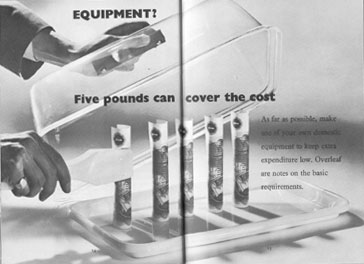How the wheel turns
This is the bitterest stroke of satire in 'Owd Yer Tight, Emrys Bryson's 1965 A-Z collage of Nottingham life. It's filed under J, for "Jack - I'm All Right":
"Guardian Journal", June, 1964. - A tumbledown block of five outside lavatories is shared by 18 adults and 19 children in Little John Street. All the nine terraced houses are more than 100 years old and are without bathrooms or even hot water. Every day the occupants have to disinfect the drains in the middle of the yard where children play between the dustbins. They spoke of damp walls, crumbling plaster, pigeons nesting in the attic, falling chimney pots and woodworm. Last year health officials had to be called in to deal with an invasion of cockraoches and ants.
The area is not due for inspection until 1966.
November 19th, 1964. - Mr J.J. Dunnett, Labour MP for Nottingham Central, told the House of Commons that in Central Nottingham alone there were 15,000 houses more than 80 years old which lacked inside sanitation, a fixed bath and a heating system. Six thousand of them not only lacked basic amenties but were so terrible that they had been condemned. Houses were sometimes so terrible that they could not be sold and were being let at rents which were exorbitant - £3 a week instead of 17/2; £4 5s instead of 16/11.
Nottingham has a housing waiting list of 5,340 families.
In 1964 Nottingham Corporation built 508 houses.
In the first six months of 1965 Nottingham Corporation completed 268 houses, and an exactly similar number was provided by private enterprise.
Nottingham is now building at the rate of 750 dwellings a year.
Since April 1945 - over 20 years - the Corporation has built 17,246 houses, a yearly average of 862. There are between 15,000 and 20,000 slum houses in the city.
January, 1965: Nottingham's No. 1 civic car is now a £10,000 Rolls Royce...
Completely justified indignation, of course, although given a sly push in the original by following a series of extracts on Victorian and Edwardian slums. What's sad is knowing that an equivalent work in 1980 would have vented its anger on tower blocks; and that the anger of the sixties would have helped raise them.
['Owd Yer Tight, by Emrys Bryson, staged Nottingham Playhouse 1965, published Nottingham 1967. A pageant-cum-guidebook-cum-scrapbook, almost entirely quotation, that ranges at will over Nottingham's history. Witty and learned and enough to make you nostalgic for the time of its writing, for all the pettinesses and injustices it describes. It's named after "the mating cry of the city's bus conductors" - these have died out, and the tram conductors who eventually came in their place have not taken up the call.]



